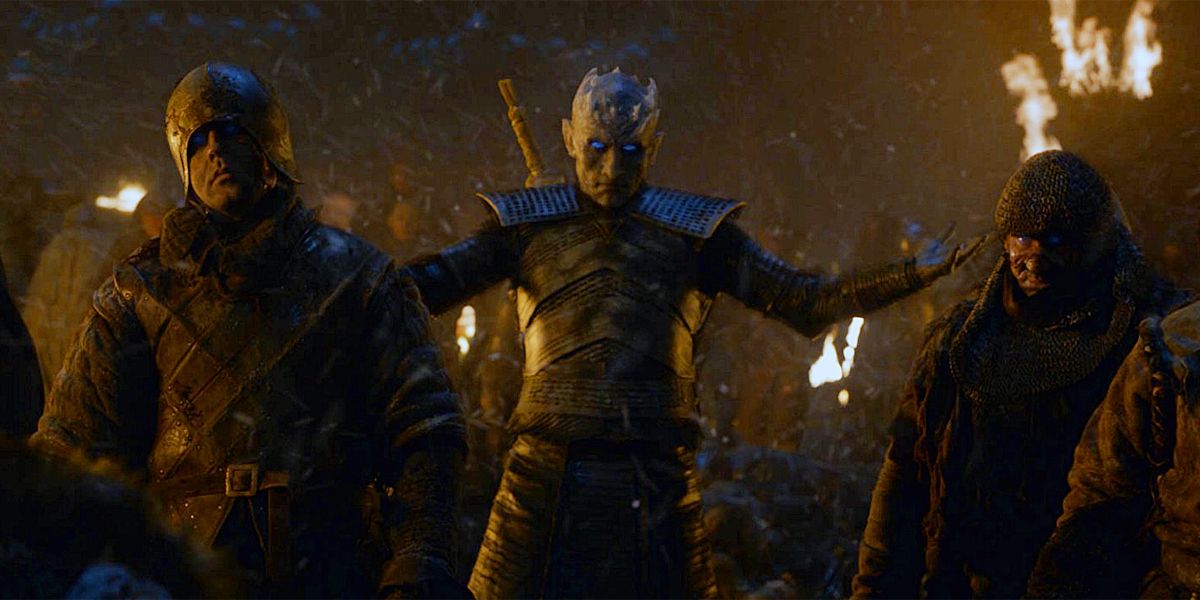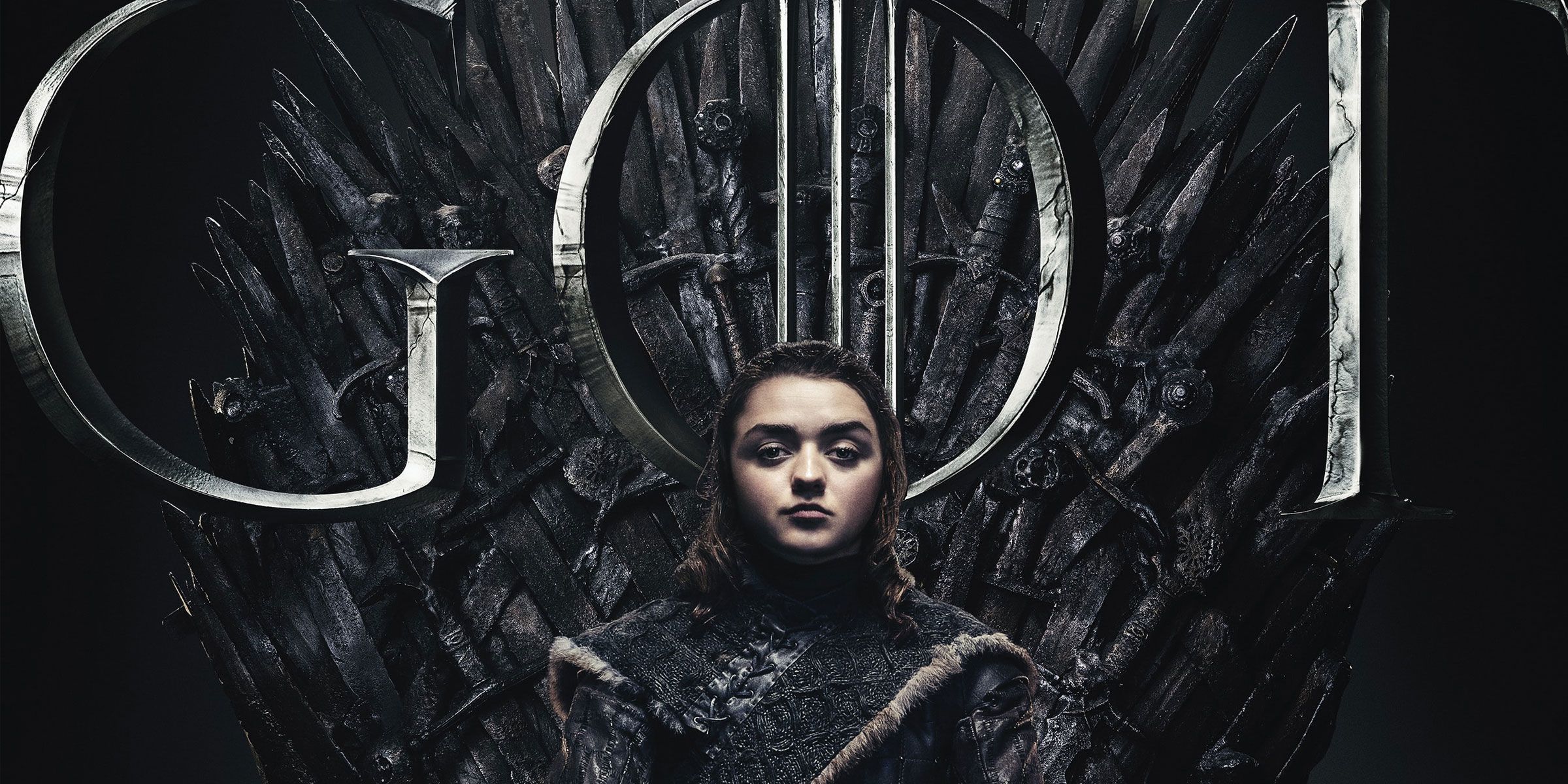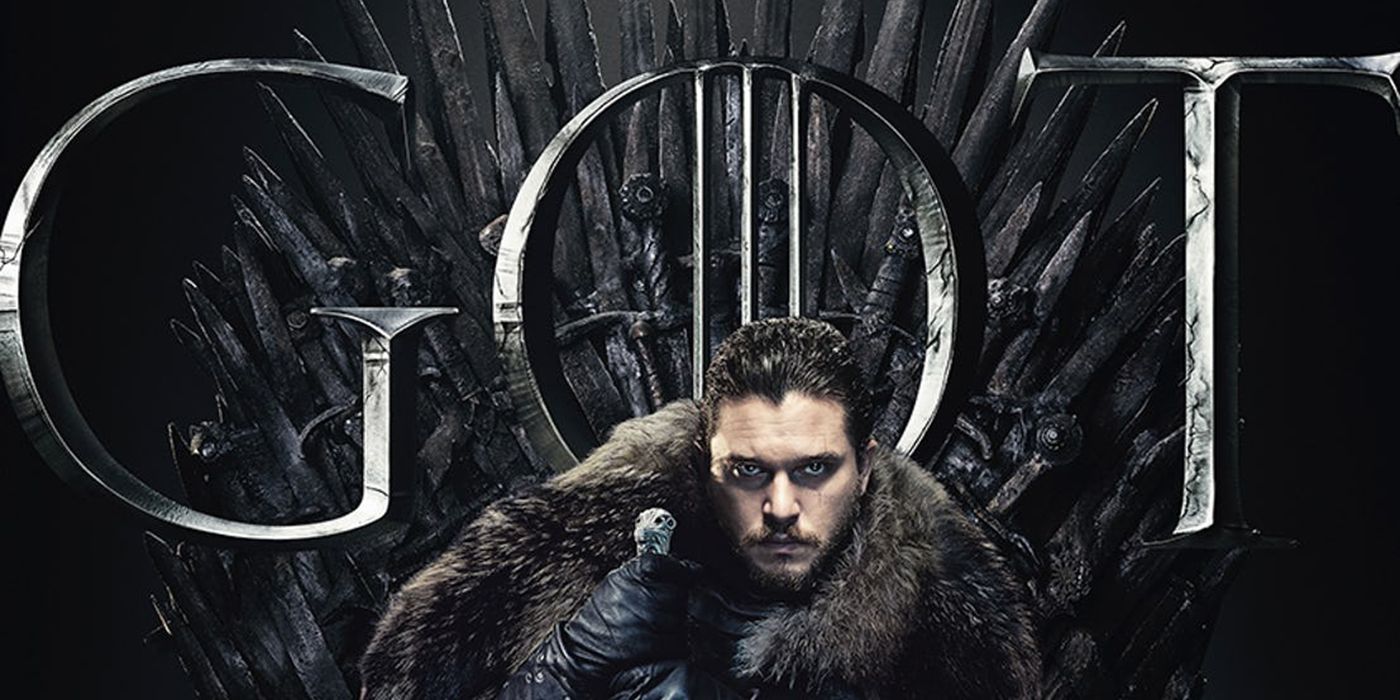Warning: This article contains major spoilers for Game of Thrones' latest episode, "The Long Night."
For those that managed to figure out the brightness controls on their TV screens, watching Games of Thrones' "The Long Night" was a heart-in-your-mouth experience from start to finish.
But even landmark television isn't immune to the sting of a lukewarm reception. At 75% on Rotten Tomatoes, the episode one of the series' lowest-rated, with critics echoing audience complaints that the cinematographers went far too method with the night-time lighting. Even the scenes that weren't swallowed up in a flurry of snow, shadow and scrabbling undead limbs were less than wholly satisfying.
Aside from spectacularly poor battle strategies -- sending the Dothraki on a suicidal charge? Hiding the women and children in a crypt during a fight against a necromancer? Come on, Team Living! -- the bulk of this disappointment and confusion has been directed towards the two participants in the episode's most pivotal scene, which you'll know if you noticed the phrase "Mary Sue" trending on Twitter recently. This specific gripe -- that it was too "easy" to beat the allegedly unstoppable Night King -- is down to two things: giving Arya Stark too little credit and, conversely, giving the Night King too much. Both have to do with the way the show has managed and, in the case of the latter, mismanaged audience expectations.
"Mary Sue" is a derogatory term rooted in fan fiction. It describes a fictional character of any gender who is inexplicably brilliant at almost everything because they function primarily as authorial wish-fulfillment, which is what the practice of fan fiction is, harmlessly, all about. The word "inexplicably" is key here to explain how ridiculously ill-fitting the label on its latest recipient: Arya Stark.
Reducing Arya's incredible one-hit K.O. to an act of Mary Sue plot logic, or a deus ex machina device, or, just a stabby girl who got lucky, completely brushes aside an eight season-long arc of growth. The episode even took the time, in-between all the Resident Evil-esque action, to remind us of this. From being told in Season 1 by Jon Snow to "stick them with the pointy end" -- which Arya brilliantly turned back on Sansa Stark in this episode -- to becoming a master assassin who calmly tells death, "not today," as Syrio Forel, her first teacher, imparted to her. (And what else is the mysterious Night King, destroyer of human life and memory, but the cold and ruthless embodiment of death?) The added repetition of Melisandre’s prophecy, which was last heard in Season 3, no longer served not to tell Arya who she will become, but who she has become; who she is now.
Yes, the small act of pushing a knife into the villain’s gut was "easy" in the moment. But in order to take her one shot, Arya had to survive being mauled by a horde of the undead in her own home, get closer to her target than anyone has before, and attack him stealthily enough at exactly the right moment with exactly the right weapon -- a weapon that no one was entirely sure would do the job. And let’s not forget her side was a hair's breadth away from defeat at that point. The obvious comparison point is Thor’s near-fatal attack on Thanos at the end of Avengers: Infinity War (which didn't garner any Mary Sue accusations at all because, well, spot the gender difference.) The moment itself isn’t the hard part, it’s being able to get to that moment.
It would be interesting to find out if the same disappointed fans would feel the same way had this victorious moment been achieved when her adopted brother charged at the villain earlier in the episode. In a lesser fantasy series, such a valiant effort from our central hero would have been rewarded: The noble Knight slays the beast, and all is well again in the Kingdom. But, this is Game of Thrones, the same show that gave us the beheading of Ned Stark and the Red Wedding. Just like those All Is Lost moments, Jon's would-be triumph slips away from him as the Night King raises a new army to start the battle all over again, and our despair only deepens.
While Jon could still be destined to sit on the Iron Throne -- which, as the title suggests, is the real point of all this -- there was a lot of expectation put on him to be to the one to kill the unkillable threat, revealing himself to be the fabled Azor Ahai hero. Instead, Jon’s potential importance in this battle was a masterful misdirect from our true heroine. If you were surprised by Arya's sneak attack, well, you were supposed to be.
But this great example of subverted expectations worked against the show when it came to the consequences of the Night King’s death. As he shattered to pieces, so too did his Generals and the magic reanimating the army of the dead. It's an all-too-convenient, well-worn fantasy cliche that you'd never expect something of Game of Thrones' caliber to resort to. This is reflected, too, in the criticism that the Battle of Winterfell cloaked too many central players in "plot armor." Having been refreshingly brutal with its character mortality rate so far, viewers were waiting, tissues prepared, to bid multiple farewells to some fan favorites. Again, the show subverted expectations, but in doing so, minimalized the emotional impact of the devastation.
The very nature of Game of Thrones, the live-action adaptation vs. Game of Thrones, the written text doesn't help, either. Television and film on the blockbuster level that the show has ascended to values spectacle above all else. For creator George R.R. Martin, however, the real drama in his books isn't on the battleground fighting existential evils, but in the politics that follow. "Lord of the Rings had a very medieval philosophy: that if the king was a good man, the land would prosper," he once critiqued of his hero, J.R.R Tolkien. "We look at real history and it's not that simple. Tolkein can say that Aragorn became king and reigned for 100 years, and he was wise and good. But Tolkien doesn't ask the question: What was Aragorn's tax policy?"
Central to the mass appeal of Martin’s saga is twisting the tropes of swords and sorcery tales, which is why, when the show indulges in some of the biggest, it feels like a betrayal of that premise. The further Game of Thrones has gotten from its source material -- and towards Event Television -- the more it's become a victim of its own success.
Airing Sundays at 9 p.m. ET on HBO, Game of Thrones stars Peter Dinklage as Tyrion Lannister, Nikolaj Coster-Waldau as Jaime Lannister, Lena Headey as Cersei Lannister, Emilia Clarke as Daenerys Targaryen, Sophie Turner as Sansa Stark, Maisie Williams as Arya Stark and Kit Harington as Jon Snow.



